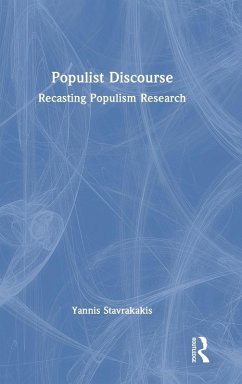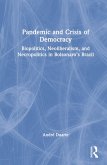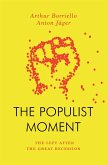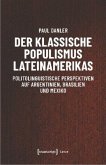Populist Discourse: Recasting Populism Research offers a refreshingly original perspective on populist phenomena. Inspired by the works of Ernesto Laclau and Chantal Mouffe, the book analyses how conceptual reflexivity, theoretical awareness and historical alertness are established as guiding principles in populism research.
Hinweis: Dieser Artikel kann nur an eine deutsche Lieferadresse ausgeliefert werden.
Hinweis: Dieser Artikel kann nur an eine deutsche Lieferadresse ausgeliefert werden.
Populist Discourse: Recasting Populism Research provides a bracing assessment of populism studies, offering an accessible and original account of developments in this field since populism first burst onto the political scene. As one of the leading scholars of the Essex School, Stavrakakis nails discourse theory firmly onto the map of contemporary populism research. He finally delivers the first comprehensive and authoritative book-length treatment of its kind since Laclau's On Populist Reason, bound to become a standard scholarly reference for years to come.
Jason Glynos, University of Essex, UK
An indispensable book illuminating the most controversial issue in contemporary politics: populism. Each chapter, masterfully organized around precisely targeted questions, allows one to navigate this field anew. The often complex theoretical fabric of discourse theory is here operationalized in order to inform and animate a robust methodology tackling heterogeneous phenomena in elucidating ways. And all this from a critical perspective that escapes from any Eurocentric attitude, revealing Stavrakakis as a truly global thinker.
Paula Biglieri, Universidad de Buenos Aires, Argentina
Populist Discourse: Recasting Populism Research is a thoughtful and timely engagement with the phenomenon of populism. Yannis Stavrakakis dispels widespread misconceptions about populism and charts new directions for thinking about populism's relationship to democracy. None of the many books on populism written over the last decade exhibit the historical sensibility, empirical sensitivity, and analytical sharpness on display in Populist Discourse. A must read for scholars and the wider public as well.
John P. McCormick, University of Chicago, USA
[The] book is theoretically rich, dense, and detailed in its argumentation. Guiding questions and key themes appear in bold throughout each chapter, and this editorial choice results in helpful signposting for the academic and nonexpert reader alike, making the text a useful one for upper-level classroom teaching.
AndreaMcDonnell, Journal of Language and Politics
Jason Glynos, University of Essex, UK
An indispensable book illuminating the most controversial issue in contemporary politics: populism. Each chapter, masterfully organized around precisely targeted questions, allows one to navigate this field anew. The often complex theoretical fabric of discourse theory is here operationalized in order to inform and animate a robust methodology tackling heterogeneous phenomena in elucidating ways. And all this from a critical perspective that escapes from any Eurocentric attitude, revealing Stavrakakis as a truly global thinker.
Paula Biglieri, Universidad de Buenos Aires, Argentina
Populist Discourse: Recasting Populism Research is a thoughtful and timely engagement with the phenomenon of populism. Yannis Stavrakakis dispels widespread misconceptions about populism and charts new directions for thinking about populism's relationship to democracy. None of the many books on populism written over the last decade exhibit the historical sensibility, empirical sensitivity, and analytical sharpness on display in Populist Discourse. A must read for scholars and the wider public as well.
John P. McCormick, University of Chicago, USA
[The] book is theoretically rich, dense, and detailed in its argumentation. Guiding questions and key themes appear in bold throughout each chapter, and this editorial choice results in helpful signposting for the academic and nonexpert reader alike, making the text a useful one for upper-level classroom teaching.
AndreaMcDonnell, Journal of Language and Politics









